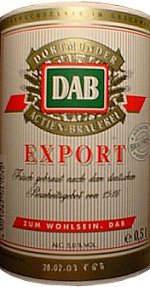 |

|
|

|
|
|
 |

home
about
features
A-Z
books

|

|

Protz:
features
reviews
tastings
|

| |
Dortmund, the "Burton of Germany"
by Willard Clarke, 04/04
Dortmund was once known as the "Burton of Germany". In the 19th and 20th centuries, the great steel-making and coal-mining city had more breweries than any other German centre of population, with a large army of thirsty industrial workers to satisfy.
They still make steel in the Ruhr - and it's something of a shock for a British visitor to find factories with smoking chimneys - but the industry is much diminished. The coalmines have closed, in step with most other European countries.
There are now fewer throats to refresh. As a result, Dortmund, like Burton, has seen considerable rationalisation. Again like Burton with Bass and Ind Coope, the city had two large and fiercely competitive giants, the Dortmunder Actien and Dortmunder Union breweries, known for short, like characters in the Flowerpot Men, as DAB and DUB.
In 1956, DUB became the first German brewery to produce more than one million hectolitres of beer a year or more than 600,000 barrels. It dominated the skyline with a great central tower from which the single, neon-lit letter U blazed out at night. The tower and the U are still there, but the brewery has been demolished.
In 1988 DUB and another Dortmund brewery, Ritter, became part of the vast Brau and Brunnen group that owns a number of German breweries and mineral water companies.
In 1994 Dortmunder Union closed and production moved to the Ritter brewery, which can now produce more than two million hectos of beer a year. In the meantime, the Oetker food and drinks group bought Dortmunder Actien.
The final indignity came last year when Oetker took over Brau and Brunnen and in one fell swoop DAB and DUB, those passionate rivals, came under the same umbrella.
|
|

|
The combined Union-Ritter brewery is now known as Brinkhoff after Fritz Brinkhoff, a famous and innovative brewmaster at Dortmunder Union in the 19th century. According to a legend, Brinkhoff developed the exceptionally pale style of beer that made Dortmund famous "by mistake" when he was sent a batch of the wrong type of malt.
The same arguments have been enshrined in brewing history in both London and Pilsen. Apparently Porter was invented in London when a brewer named Ralph Harwood in Shoreditch was sent the wrong type of malt and the mistake was repeated 150 years later in Pilsen when the head brewer at the Citizens' Brewery was given a pale malt that enabled him to brew the first golden lager.
I am sceptical about such stories as I think any experienced brewer would notice from the colour if he had been given the wrong type of malt. What is not in dispute in Dortmund is that, once the lagering or cold storage of beer developed in the late 19th century, the breweries in the city developed a unique style of beer called Export.
It wasn't exported far and certainly not further than other towns in Westphalia and across the border into the Netherlands, where brewers today still make beers they call "Dort" for short.
Export beer has a soft and malty drinkability, designed to refresh steel workers and coal miners after long, hot and arduous shifts. It was the German equivalent of the light versions of Mild brewed in England for similar groups of blue-collar workers.

|
|
Today both Brinkhoff and DAB produce Export but they are shy about admitting it. All the emphasis is on Pils-type lager. At Brinkhoff - after a tour of the enormous brewery that can produce seven brews a day totalling
9,000 hectos of beer - I was given several glasses of a perfectly acceptable Pils called Brinkhoff's No1 but had to badger the staff to find some Export.
Finally it appeared, pale gold in colour and, at 5.3% stronger than the Pils. It has a big rocky head of foam, an aroma reminiscent of digestive biscuits and tart hop resins, a juicy malt and gently bitter palate with a touch of lemon fruit, and a short bitter-sweet finish beautifully balanced between malt, fruit and hops.
This is one of the world's great beer styles and is in danger of withering on the vine. I suggested to Brinkhoff that they should try Exporting it but the joke got lost in translation. |
|
|
home
about
features
A-Z
books
|

